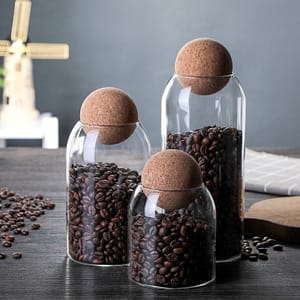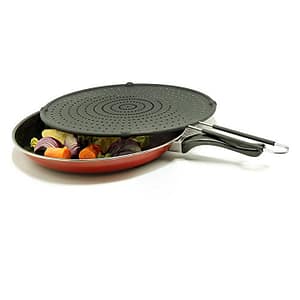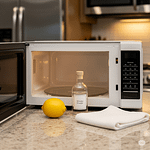
Blog Details

The Unexpected Kitchen Secret That Could Add Years to Your Life (It’s Not What You Think!)
We’re constantly bombarded with advice on how to live longer, healthier lives: “Eat your greens,” “Exercise daily,” “Get enough sleep.” All vital, of course. But what if there was a subtle, often overlooked aspect of your home, specifically your kitchen, that holds a surprising key to your longevity? It’s not a superfood, a new appliance, or a complicated cooking technique. It’s far simpler, yet profoundly impactful.
The unexpected secret? The cleanliness and organization of your kitchen.
Yes, you read that right. While it might sound mundane compared to kale smoothies or marathon training, a systematically clean and organized kitchen significantly contributes to a healthier, potentially longer life. Let’s delve into why this seemingly simple habit is so powerful.
Beyond the Obvious: Why a Clean Kitchen Matters for Longevity
-
Reduced Exposure to Harmful Pathogens: This is the most direct benefit. A cluttered, dirty kitchen is a breeding ground for bacteria like Salmonella, E. coli, and Listeria. These can lead to foodborne illnesses, which, while often uncomfortable, can have serious long-term health consequences, especially for older adults or those with compromised immune systems. Regular cleaning, sanitizing surfaces, and proper food storage drastically reduce this risk. Think about it: a quick wipe-down of your high-quality cutting board after each use, or storing leftovers in airtight containers, prevents unseen threats from flourishing.
-
Decreased Stress and Improved Mental Well-being: A chaotic environment is a stress trigger. Walking into a messy kitchen filled with dirty dishes and scattered appliances can instantly elevate cortisol levels. Chronic stress is a known contributor to a host of health issues, including heart disease, high blood pressure, and weakened immunity. Conversely, a clean, organized space promotes calm and mental clarity. Imagine the peace of mind knowing everything has its place, making meal prep a joy rather than a chore. This sustained reduction in everyday stress indirectly supports longevity.
-
Encourages Healthier Eating Habits: When your kitchen is a welcoming, functional space, you’re more likely to use it. A clean countertop invites cooking, rather than ordering takeout. When you have easy access to your fresh ingredients and a well-arranged pantry, healthy meal preparation becomes less daunting. This subtle shift from convenience foods to home-cooked meals, rich in whole ingredients, is a cornerstone of a long and healthy life. Have you noticed how much easier it is to whip up a nutritious dinner when your premium knife set is neatly stored and readily accessible, and your quality kitchen tools are within reach?
-
Minimizes Accidents and Injuries: Slips, falls, and cuts are common kitchen accidents. Clutter on the floor or countertops increases the risk of tripping. Dull knives or poorly maintained appliances (often neglected in a disorganized space) are also more likely to cause injuries. A clean, well-maintained kitchen inherently reduces these physical hazards, preventing trips to the emergency room that can disrupt health and well-being.
-
Better Sleep Quality (Indirectly): How does a clean kitchen impact sleep? By reducing evening stress. If you’re constantly thinking about the mess waiting for you in the morning, or if you’re rushing to clean up before bed, it adds to your mental load. A tidy kitchen allows for a more relaxed evening routine, contributing to better sleep hygiene. And we all know the profound impact of quality sleep on overall health and longevity.
Making the Shift: Simple Steps to Your Longevity Kitchen
You don’t need to overhaul your entire kitchen overnight. Small, consistent habits make the biggest difference:
- Daily Tidy-Up: A quick 10-15 minute clean after dinner – wash dishes, wipe down counters, sweep crumbs.
- Declutter Regularly: Designate a day each month to go through your pantry and cupboards. Get rid of expired items and donate unused gadgets.
- Invest in Storage Solutions: Good containers, drawer organizers, and shelving can make a huge difference in maintaining order. (Perhaps consider some of our sleek food storage container sets from KitchenWhizdom.store?)
- Deep Clean Routinely: Schedule a more thorough cleaning of appliances and surfaces weekly or bi-weekly.
This isn’t just about aesthetics; it’s about creating an environment that supports your physical and mental health. By embracing the unexpected secret of a clean and organized kitchen, you’re not just tidying up – you’re actively investing in a longer, healthier, and happier life.
FAQs About Kitchen Cleanliness and Health
Q1: How often should I deep clean my kitchen? A1: Ideally, a deep clean of your kitchen (appliances, grout, inside cupboards) should be done quarterly, or at least twice a year. Daily wiping and weekly tidying are crucial for maintenance.
Q2: What are the most common places for germs in the kitchen? A2: Kitchen sponges/dishcloths, cutting boards, sinks, refrigerator handles, and countertops are often the germiest spots. Regular cleaning and sanitizing of these areas are essential.
Q3: Can a cluttered kitchen really affect my mental health? A3: Absolutely. Studies show that cluttered environments can increase stress, anxiety, and even impact focus. A tidy space promotes a sense of calm and control, which positively affects mental well-being.
Q4: Are there specific cleaning products that are better for health? A4: While powerful disinfectants are sometimes necessary, for daily cleaning, many prefer natural options like white vinegar, baking soda, and lemon juice. Always ensure you’re using products safely and according to instructions, and consider non-toxic options where appropriate.
Q5: How can I keep my kitchen organized if I have limited space? A5: Maximizing vertical space with shelves, using drawer dividers, investing in stackable containers, and decluttering regularly are key strategies for small kitchens. Every item should have a designated “home.”
Our Products
-
Unique Book Coffee Cup – Stack of Books Design
$19.12 – $19.28Price range: $19.12 through $19.28 Select options This product has multiple variants. The options may be chosen on the product page -
Salt & Pepper Electric Grinder – Rechargeable
$27.70 Select options This product has multiple variants. The options may be chosen on the product page -
Glass Storage Jar – Cork Lid & Minimalist Design
$29.16 Select options This product has multiple variants. The options may be chosen on the product page -
Food grade Silicone Splash Screen – Mess-Free Cooking
$24.55 Select options This product has multiple variants. The options may be chosen on the product page -
Stainless Steel Corn Cob Holders – Mess-Free
$12.35 Select options This product has multiple variants. The options may be chosen on the product page -
Silicone Donut Mold – Makes 6 Non-Stick Donuts
$9.47 Select options This product has multiple variants. The options may be chosen on the product page
Products
-
Unique Book Coffee Cup – Stack of Books Design
$19.12 – $19.28Price range: $19.12 through $19.28 Select options This product has multiple variants. The options may be chosen on the product page -
Salt & Pepper Electric Grinder – Rechargeable
$27.70 Select options This product has multiple variants. The options may be chosen on the product page -
Glass Storage Jar – Cork Lid & Minimalist Design
$29.16 Select options This product has multiple variants. The options may be chosen on the product page -
Food grade Silicone Splash Screen – Mess-Free Cooking
$24.55 Select options This product has multiple variants. The options may be chosen on the product page









